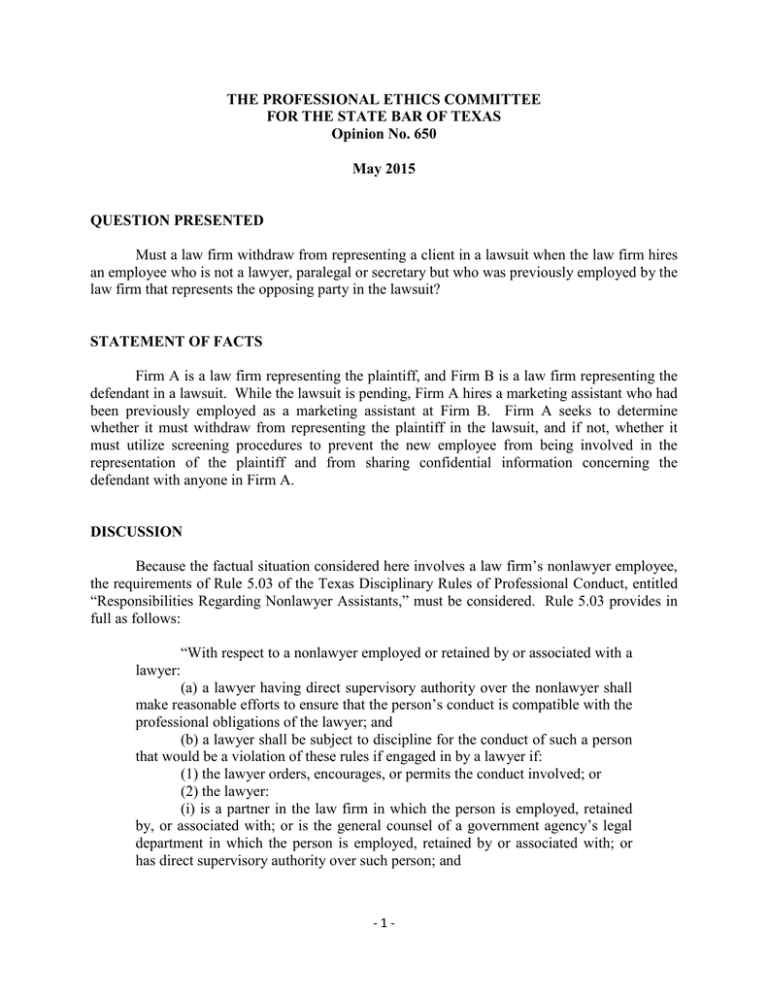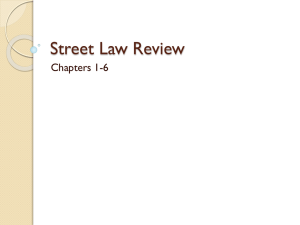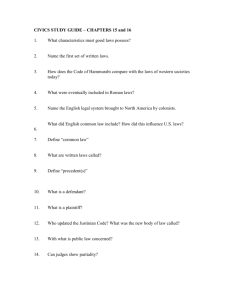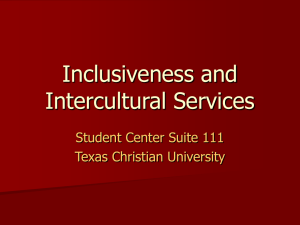THE PROFESSIONAL ETHICS COMMITTEE FOR THE STATE BAR OF TEXAS
advertisement

THE PROFESSIONAL ETHICS COMMITTEE FOR THE STATE BAR OF TEXAS Opinion No. 650 May 2015 QUESTION PRESENTED Must a law firm withdraw from representing a client in a lawsuit when the law firm hires an employee who is not a lawyer, paralegal or secretary but who was previously employed by the law firm that represents the opposing party in the lawsuit? STATEMENT OF FACTS Firm A is a law firm representing the plaintiff, and Firm B is a law firm representing the defendant in a lawsuit. While the lawsuit is pending, Firm A hires a marketing assistant who had been previously employed as a marketing assistant at Firm B. Firm A seeks to determine whether it must withdraw from representing the plaintiff in the lawsuit, and if not, whether it must utilize screening procedures to prevent the new employee from being involved in the representation of the plaintiff and from sharing confidential information concerning the defendant with anyone in Firm A. DISCUSSION Because the factual situation considered here involves a law firm’s nonlawyer employee, the requirements of Rule 5.03 of the Texas Disciplinary Rules of Professional Conduct, entitled “Responsibilities Regarding Nonlawyer Assistants,” must be considered. Rule 5.03 provides in full as follows: “With respect to a nonlawyer employed or retained by or associated with a lawyer: (a) a lawyer having direct supervisory authority over the nonlawyer shall make reasonable efforts to ensure that the person’s conduct is compatible with the professional obligations of the lawyer; and (b) a lawyer shall be subject to discipline for the conduct of such a person that would be a violation of these rules if engaged in by a lawyer if: (1) the lawyer orders, encourages, or permits the conduct involved; or (2) the lawyer: (i) is a partner in the law firm in which the person is employed, retained by, or associated with; or is the general counsel of a government agency’s legal department in which the person is employed, retained by or associated with; or has direct supervisory authority over such person; and -1- (ii) with knowledge of such misconduct by the nonlawyer knowingly fails to take reasonable remedial action to avoid or mitigate the consequences of that person’s misconduct.” In the circumstances here considered, Firm A and its lawyers are required by Rule 5.03 to employ the newly hired marketing assistant in a way that avoids conduct that, if by a lawyer, would violate other provisions of the Texas Disciplinary Rules of Professional Conduct. Rules of particular concern here are Rule 1.05, requiring protection of confidential client information, and Rule 1.09, prohibiting certain representations adverse to a lawyer’s former client. Taken as a whole, these rules require a law firm to manage nonlawyer employees so that confidential information of clients of a nonlawyer’s former law firm employer is protected from unauthorized disclosure or use against the clients of the former law firm. A law firm is not automatically barred from representation in a lawsuit because the firm employs a nonlawyer who formerly worked for another law firm while that firm was representing an adverse party in the lawsuit. However, the employing law firm may be prohibited from continuing the representation if it fails to take reasonable steps to protect confidential information concerning the adverse party that may be in the possession of the new nonlawyer employee. See Professional Ethics Committee Opinion 472 (June 1991) (concerning employment of a secretary or legal assistant). Also see the discussion regarding nonlawyer employees in Opinion 644 (August 2014) (concerning a newly hired lawyer who before becoming a lawyer worked as a law clerk for another law firm in its representation of a party in a lawsuit in which the new lawyer’s current employer represents the opposing party). In this case, Rule 5.03 requires that the lawyers in Firm A make reasonable efforts to ensure that their nonlawyer personnel receive sufficient training so that they understand and act consistently with the obligations of the firm and its lawyers with respect to protecting the confidential information of clients of a nonlawyer employee’s former law firm employer. The lawyers in Firm A could be subject to discipline if the newly hired marketing assistant has confidential information concerning the defendant and the law firm orders, encourages or permits the new employee to disclose or use such confidential information to the disadvantage of the defendant or if the firm fails to take reasonable remedial action after learning of the disclosure or use of such confidential information. In the event of a disclosure or use of such confidential information, Rule 1.06(b)(2) may also require Firm A to withdraw from representing the plaintiff because its continuing representation in the lawsuit may reasonably appear to be adversely limited by the lawyers’ or law firm’s responsibilities to a third person, namely the defendant, or by the lawyer’s or law firm’s own interests. In the absence of an actual disclosure or use by the marketing assistant of confidential information acquired prior to employment, the lawyers in Firm A generally would not be subject to discipline under the Texas Disciplinary Rules. However, even if there is no actual disclosure or use of confidential information, Firm A could be subject to disqualification by a court. Although courts often look to the Texas Disciplinary Rules of Professional Conduct in deciding disqualification issues, the Texas Disciplinary Rules are merely guidelines, rather than controlling standards, in judicial decisions on disqualification. See, e.g. In re NITLA S.A. de C.V., 92 S.W.3d 419, 422 (Tex. 2002); In re de Brittingham, 319 S.W.3d 95, 98 (Tex. App.-San Antonio 2010, orig. proc.). In Texas courts, if a member of Firm B’s staff, such as a secretary or -2- paralegal, worked on the matter involving the defendant in the lawsuit and then left Firm B to go to work for Firm A, to avoid disqualification, Firm A must put in place adequate screening procedures for the purpose of preventing the newly hired employee from disclosing or using the defendant’s confidential information. In re Guaranty Insurance Services, Inc., 343 S.W.3d 130 (Tex. 2011); In re Columbia Valley Healthcare System, L.P., 320 S.W.3d 819 (Tex. 2010); Grant v. Thirteenth Court of Appeals, 888 S.W.2d 466 (Tex. 1994); Phoenix Founders, Inc. v. Marshall, 887 S.W.2d 831 (Tex. 1994). These decisions all recognize that when a lawyer or a staff member of a law firm works on a matter for a client, there is a conclusive presumption that confidential information of the client is imparted to the lawyer or staff member. This conclusive presumption prevents the client from being required to reveal the confidential information as part of a disqualification action. In these decisions, there is also a second presumption that the nonlawyer employee shares the client’s confidential information with the lawyers in his or her new firm, but that presumption is not conclusive and can be overcome by the implementation of appropriate screening procedures. In contrast, in the case of a lawyer moving from one firm to another the second presumption is conclusive and screening will not avoid the disqualification of the law firm. See Professional Ethics Committee Opinions 598 (July 2010) and 578 (July 2007); Henderson v. Floyd, 891 S.W.2d 252, 254 (Tex. 1995). Compare Opinion 644 (August 2014) (screening not effective in the case of a newly hired lawyer who before becoming a lawyer worked as a law clerk for another law firm in its representation of a party in a lawsuit in which the new lawyer’s current employer represents the opposing party). In this case, if Firm A utilizes appropriate screening procedures designed to prevent the newly hired employee from revealing or using confidential information of the defendant to the detriment of the defendant, Firm A does not need to consider withdrawing from representation of the plaintiff in the lawsuit unless the newly hired employee actually reveals confidential information of the defendant to someone else in Firm A or actually works on the lawsuit. See In re Guaranty Insurance Services, Inc., 343 S.W.3d 130 (Tex. 2011). The one remaining question is whether Firm A is required to utilize appropriate screening procedures with respect to the newly hired marketing assistant to avoid being disqualified from representing the plaintiff in the lawsuit. The facts considered in this opinion are that the employee worked as a marketing assistant both for Firm B and then for Firm A. The position or duties of the employee, however, are not determinative. The critical issue is whether the employee worked on the matter in which Firm B was representing the defendant in the lawsuit or otherwise had access to information relating to Firm B’s representation of the defendant. If not, there is no presumption, conclusive or otherwise, that confidential information of the defendant was imparted to the employee while working at Firm B. In re Columbia Valley Healthcare System, L.P., 320 S.W.3d 819, 828 (Tex. 2010) (“We finally note that these requirements apply only to nonlawyer employees who have access to material information relating to the representation of clients . . . .”). However, if the employee had worked on the matter in which Firm B was representing the defendant in the lawsuit or otherwise had access to information relating to Firm B’s representation of the defendant, it would be necessary for Firm A to utilize appropriate screening procedures in order to avoid disqualification. On the other hand, screening procedures would not be necessary if Firm A could determine, perhaps in part based on the marketing assistant’s duties at Firm B and in part based on the employee’s statements to the firm, that the employee had not worked on the matter in which Firm B was representing the defendant -3- in the lawsuit and did not otherwise have access to information relating to Firm B’s representation of the defendant. In making a decision not to implement screening procedures, Firm A would be taking a risk that could result in the firm later being disqualified from representation of the plaintiff in the lawsuit. If the facts turn out to be otherwise than Firm A believes and the new employee did in fact work on the matter in which Firm B was representing the defendant in the lawsuit or otherwise had access to information relating to Firm B’s representation of the defendant, Firm A could be disqualified from representing the plaintiff in the lawsuit because of the failure to implement screening procedures. Reliance on the employee’s statements to the contrary would not change that result. Firm A can best avoid this risk by utilizing appropriate screening procedures with respect to the newly hired marketing assistant. CONCLUSION Under the Texas Disciplinary Rules of Professional Conduct, a law firm representing a party in a lawsuit that hires an employee who is not a lawyer, paralegal or secretary but who was previously employed by the law firm that represents the opposing party in the lawsuit may in some circumstances be required to withdraw from the representation. The hiring law firm will be required to withdraw from the representation if the employee in question had in the prior employment worked on the lawsuit or otherwise had access to information concerning the prior employer’s representation of the opposing party in the lawsuit and the hiring law firm fails to take effective steps, which normally would include screening the newly hired employee, to prevent the employee from disclosing or using in the hiring law firm confidential information related to the lawsuit. In all other circumstances, the hiring law firm will not be required to withdraw from the representation unless, regardless of the hiring law firm’s attempts to prevent improper disclosure or use of any confidential information relating to the lawsuit acquired by the employee in the prior law firm, the employee actually discloses or uses such confidential information in the hiring law firm. Because issues of disqualification are determined by the courts based on standards that are not necessarily identical with the requirements of the Texas Disciplinary Rules of Professional Conduct, in some circumstances a law firm may be held to be disqualified from a representation even if there has been full compliance by the law firm with the requirements of the Texas Disciplinary Rules concerning successive employment of non-lawyer employees. -4-





